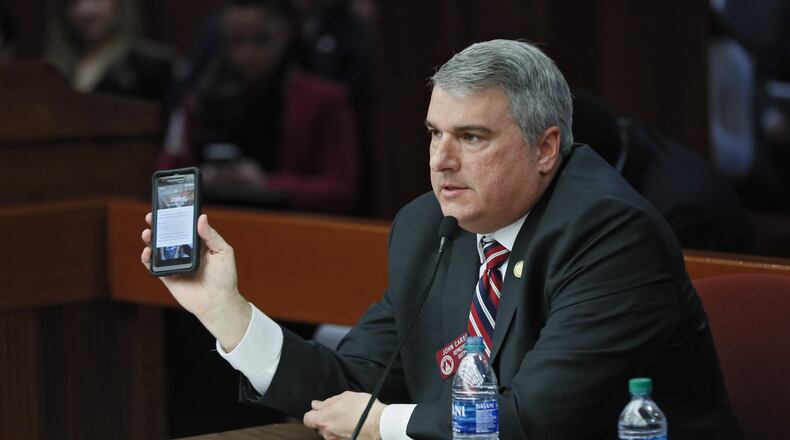A bill that would increase fines for distracted driving got a skeptical reception from some Georgia lawmakers Monday.
House Bill 113 would raise fines for drivers who handle their cellphones or other electronic devices while driving. The current fine is $50. Under the bill, it could be as high as $100. Fines for subsequent offenses also would increase.
At a hearing Monday before the House Public Safety and Homeland Security Committee, supporters said Georgia motorists have had two years to get accustomed to the state's ban on handling phones while driving. The say stiffer fines are needed because many people are ignoring the law.
"People are not adhering to the law. It's pretty negligent," said state Rep. John Carson, R-Marietta, the bill's sponsor. "What we're trying to do here is create more deterrent."
Some lawmakers questioned whether raising fines is the best approach. They wondered whether additional educational efforts or other methods make more sense.
"I understand what your goal is," said state Rep. Scott Holcomb, D-Atlanta. "I'm questioning whether just raising the dollar figure of the fine will achieve that."
HB 113 would be the first update to the Hands-Free Georgia Act, which prohibited motorists from handling their phones while driving beginning in 2018. Under the law, motorists can use such devices if they use hands-free technology. But supporting a device with any part of their body is illegal.
The Georgia State Patrol wrote nearly 25,000 distracted driving citations in the first year after the law took effect. Early evidence suggested the new law has had an impact — Georgia traffic fatalities fell 2.2% to 1,515 in 2018 and an additional 4% last year.
But anyone driving on metro Atlanta highways can still see plenty of drivers with their eyes glued to their phones instead of the road.
Under the bill, the fine for a first offense would be $50 to $100, at a judge’s discretion. The fine for a second offense would range from $100 to $200, and a third offense would cost $150 to $300.
The bill also would raise fines for distracted driving offenses within school and construction zones. It would eliminate a provision that allows first-time offenders off the hook if they buy hands-free technology. And it would allow additional fees to be collected for citations, with the money intended to go to the Georgia Trauma Trust Fund, which helps pay for emergency medical services.
That got a skeptical reception from lawmakers, who noted that fees and fines intended for a particular purpose often are spent on other purposes.
"When does a fine become a tax?" asked state Rep. Alan Powell, R-Hartwell. "That's what this is doing."
Carson noted that taxes are compulsory, while a fine is meant to punish a misdemeanor offense. And he said a $100 fine pales in comparison with the thousands of dollars in medical and property damage bills caused by a distracted driving crash.
“I know people don’t want to go back home in an election year and talk about how they voted for a $100 fine,” Carson told the committee. “But I want you to understand the gravity of this issue and how little, how miniscule is a $100 fine compared to a bodily injury.”
The committee took no vote. Lawmakers are expected to offer amendments and discuss the bill again at an upcoming meeting.
About the Author
Keep Reading
The Latest
Featured




